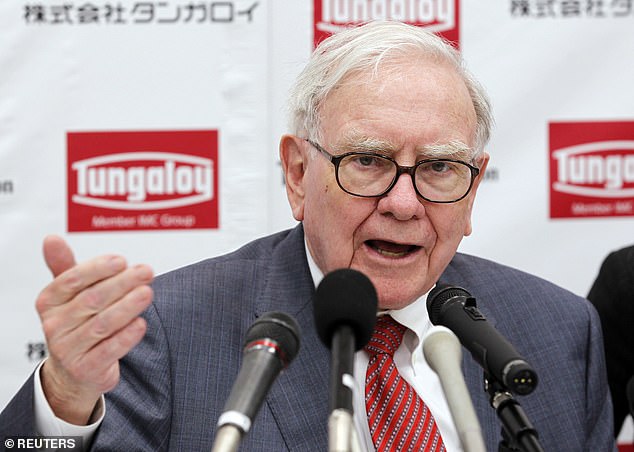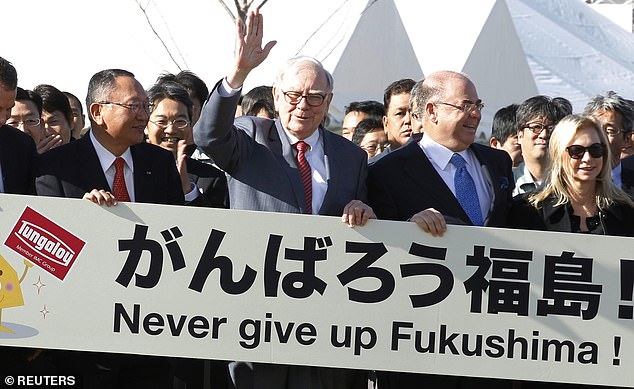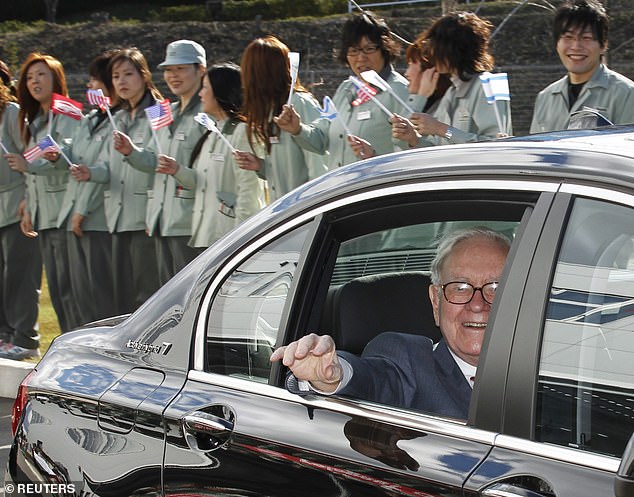Warren Buffett alleviated concerns over Berkshire Hathaway's cash hoarding by stating his intention to make significant investments in the near future, with a focus on one burgeoning market.
The 94-year-old billionaire informed investors in his annual letter that, despite having the largest amount of cash reserves ever, the value of the companies his firm owns has also grown significantly.
Berkshire Hathaway's investment strategy has been under close examination in recent times, following the sale of significant stock shares by Buffett, leaving the firm with a substantial $321.4 billion in cash and Treasury bills at the end of 2024.
In his annual letter to shareholders on Saturday, Buffett wrote: "Despite what some commentators currently view as an extraordinary cash position at Berkshire, the overwhelming majority of your money remains invested in equities.
'That preference won't change.'
Warren Buffett announced that he plans to increase the firm's stakes in five Japanese trading companies - Itochu, Marubeni, Mitsubishi, Mitsui, and Sumitomo.
Warren Buffett started acquiring stakes in the five companies in July 2019, and the CEO recently announced that they have consented to his purchasing more than the previously set 9.9% ownership cap.
As we approached this threshold, the five companies agreed to moderately ease the cap, Buffett wrote. 'Over time, you will likely see Berkshire's stake in all five grow somewhat.'


Some critics have interpreted Berkshire Hathaway's accumulation of cash as a signal that Buffett is anticipating a market downturn, even as the S&P 500 has hit new all-time highs in recent weeks.
Berkshire has been retaining its cash reserves by forgoing a second consecutive quarter of stock buybacks, according to the Wall Street Journal.
The company did not purchase its own shares in the last three months of 2024, which, according to the financial source, 'implies that Buffett believes Berkshire's stock is not undervalued.'
By the end of 2024, Berkshire's Japanese investments had reached a market value of $23.5 billion, with Buffett anticipating further growth.
Berkshire's investment in Japanese trading houses in 2019 involved companies operating in numerous sectors. When speaking with Nikkei in 2023, Buffett acknowledged that he was drawn to these companies because they 'are really so much similar to Berkshire.'
Known as "sogo shosha," the Japanese trading companies engage in a broad range of transactions involving various materials, products, and food, frequently acting as intermediaries, and offering logistical support.
They are also deeply involved in the actual economy in areas such as commodities, shipping, and steel production.
Buffett prefers to avoid businesses he says he doesn't understand, and since the trading houses are perceived as stable in the market due to their central role in the Japanese economy, Buffett stated that he has no intention of selling his business interests in the companies.
In his message to investors, Buffett commended his investors for upholding his approach to forgoing dividend payments on their earnings, a strategy he has consistently adhered to, with the only exception being in 1967.
He stated that reinvesting Berkshire's profits instead of distributing them to its clients has generated significantly higher returns.

Berkshire's total market value exceeded $1 trillion for the first time last year, according to the letter, which attributed this milestone to the strategy of rapid growth.
Berkshire shareholders have, to a very small extent, been part of the American miracle by choosing not to receive dividends, instead opting to reinvest their funds.
'Initially, this reinvestment was small, almost insignificant, but over time, it expanded, reflecting the combination of a long-standing culture of saving, along with the power of long-term compounding.'
The annual letter concluded with a positive outlook for Berkshire's 2024 results, stating profits of $89 billion.
Although this was a decrease from $96.2 billion in the previous year, Buffett encouraged shareholders to focus on operating earnings, which increased to $47.4 billion, up from $37.4 billion in the previous year.
The billionaire pointed out that net income is significantly more susceptible to market fluctuations, yet the company is holding steady as its Class A and Class B shares both rose approximately 5.6% in comparison to the S&P 500's 2.2% increase.
Read more